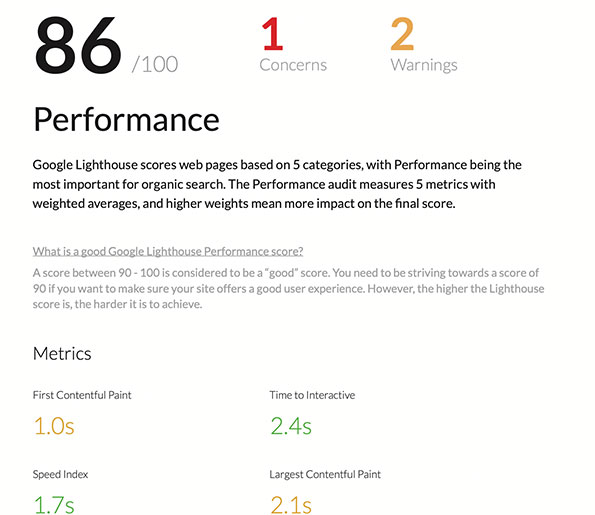Shine a light with Google Lighthouse and optimise your website for success
Website optimisation refers to the process of improving a website’s performance, user experience, and search engine visibility. This critical aspect of web development involves making adjustments to various elements of the website. Changes to the design, content, and code to ensure that it is responsive, informative, and appears in search engine results. By continuously monitoring and optimising your website, you can ensure that your site remains effective and competitive in an ever-changing online landscape. But how do you optimise your website for success?
What do I need to look for when optimising my website?
Website optimisation is important for several reasons;
Improve user engagement and satisfaction
Ensuring that your website is easy to use, loads quickly, and provides relevant and helpful information will in turn, increase the likelihood of users returning to the site and engaging with the content.
Improve a website’s search engine rankings
This is critical for attracting new visitors and driving traffic to the site. By optimising the site’s content and structure, you can make it more attractive to search engines. Furthermore it will increase the likelihood that it will appear at the top of search engine results pages.
Achieve your goals by driving more conversions
This might look like making a sale, generating leads, or simply increasing engagement with your brand. By making it easier for users to find what they are looking for and take action, website optimisation can help businesses achieve higher conversion rates and improve their bottom line.
So where does Google Lighthouse come in?
Google Lighthouse is an open-source automated tool provided by Google that helps developers and webmasters measure and improve the quality and performance of websites. It analyses web pages and provides comprehensive reports on various aspects of a website’s performance, accessibility, best practices, and search engine optimisation (SEO). The tool evaluates websites based on a set of audits and provides actionable recommendations to optimise and enhance the overall user experience.
The primary purpose of Google Lighthouse is to assist in identifying areas of improvement for your websites. By running an audit with Lighthouse, users can gain insights into how well their website performs across different metrics. Additionally you can obtain specific recommendations on how to optimise your website for better performance, accessibility, and SEO.
The benefits of optimising your websites with Google Lighthouse
Lighthouse focuses on four main categories during the analysis:
1. Optimise your website performance
Lighthouse assesses various factors that impact website speed and loading times, including network connectivity, resource loading, and rendering. It provides insights on opportunities to optimise performance, such as reducing server response times or leveraging browser caching.
2. Improve your website accessibility
This category evaluates how well a website caters to users with disabilities or impairments. Lighthouse checks for accessibility best practices and provides recommendations to improve accessibility. This might be providing alternative text for images or enhancing keyboard navigation.
3. Embrace website best practices
Lighthouse examines general best practices for web development, including security, code quality, and adherence to web standards. It identifies areas where improvements can be made, such as using HTTPS for secure communication or optimising code and assets.
4. Optimise your website with improved SEO features
Lighthouse evaluates the website’s adherence to SEO best practices and provides recommendations to optimise its visibility in search engine rankings. It examines factors such as meta tags, headings, mobile-friendliness, and structured data markup.
These elements are so important to designing a good website we feature all four of them in our top 5 things makes a good website. So any tool that can help you get more from them is vital to get the most from your investment!
How does Google Lighthouse help optimise your website?
Lighthouse has several features that enable it to analyse and report on different aspects of website performance. Here is a brief overview of Google Lighthouse’s features:

Audits
Google Lighthouse uses a set of pre-defined audits to assess the website’s performance, accessibility, best practices, and SEO. The tool evaluates various elements of the website, such as code quality, resource loading, network connectivity, and user experience, to identify areas where improvements can be made.
<Image – annotated audit screen shot>
Reports
Lighthouse generates comprehensive reports that provide detailed insights into a website’s performance across various metrics. The reports include scores for each category, as well as specific recommendations and opportunities for improvement.
<Image – annotated report screen shot>


Simulations
Lighthouse simulates various network and device conditions to evaluate website performance in different scenarios. For example, it can simulate a slow 3G network or a low-end mobile device to identify areas where the website could be optimised for these conditions.
<Image – annotated simulation screen shot>
How can I use Google Lighthouse reports to improve my website’s performance?
Overall, Google Lighthouse’s features enable it to provide a detailed and comprehensive analysis of a website’s performance, accessibility, best practices, and SEO. The tool measures performance using a variety of metrics and simulations. In turn allowing you to identify areas of improvement and make informed decisions to optimise their website’s performance.
Hopefully this blog post will provide you with a comprehensive understanding of the benefits of using Google Lighthouse. Encouraging you to start using this powerful tool to improve your website’s performance, user experience, search engine rankings, and accessibility.
What to do with the results of your Google Lighthouse reports?
It’s so easy to get started but we appreciate interpreting the results maybe a little trickier. Although you can easily run the reports knowing what to do with the results might be a bit more of a stretch. Webmasters and web developers will have the experience to interpret the results and recommend changes to help you achieve your goals. Gold Pebble specialises in website optimisation and improvement, and we can help you achieve your goals.
We use tools like Google Lighthouse to measure your website’s performance along with our experience and expertise to identify areas where improvements can be made. Our team of experienced web developers and designers can work with you to make changes to your website’s design, content, and code to improve its speed, accessibility, and user experience. We can also help optimise your website for search engines and ensure that it meets best practices for SEO.
Don’t let a poorly performing website hold you back from achieving your business goals. Contact us today to learn more about our website optimisation services and how we can help take your website to the next level.